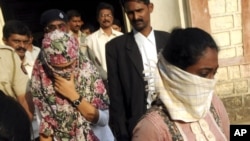NEW DELHI —
In India, a controversial law governing offensive material posted online will be reviewed following an outcry over its misuse. The move follows the recent arrest of two young women in connection with what many call an innocuous Facebook post.
Hearing a petition against Section 66A of the Information Technology Act, the Supreme Court said the wording of the law is not well-intentioned and can be misused. It says the law needs to be revisited.
The petition was made in the Supreme Court following a public outcry over the arrest of two Mumbai women on charges of spreading hatred.
One of them posted a Facebook comment last week questioning why Mumbai was shutdown following the death of right wing Hindu politician Bal Thackeray. She said the city had closed out of fear, not out of respect. A friend who “liked” the post was also arrested.
They were later released on bail and the charges against them were dropped. Two police officers were suspended.
But a backlash against the arrests for posting a mild comment has prompted scrutiny of the law.
Experts say the law under which the arrests were made is too vaguely written and sweeping in its powers - it carries jail sentences up to three years for sending an e-mail or other electronic message that “causes annoyance or inconvenience.”
Pavan Duggal, a cyber law expert in New Delhi, calls the law a “can of worms”, and capable of immense misuse.
“The law does not define what is grossly offensive, it does not define what is menacing in character," said Duggal. "This leaves it completely to the subjective discretion of the police and the complainant to determine what kind of free speech could be classified as grossly offensive or menacing. That is leading to tremendous power of potential abuse.”
There have been earlier instances of the misuse of the law. In October a businessman was arrested in Pondicherry for a a post on the social media site Twitter criticizing the son of India’s Finance Minister. In April, a teacher was arrested in West Bengal for e-mailing a cartoon critical of the state’s Chief Minister to friends.
India’s Information Technology Minister, Kapil Sibal, says the government has issued new guidelines barring lower level police officials from making arrests under the law. But demands are growing for scrapping several sections of the law. India had earlier come under criticism for clamping down on Internet freedom by trying to regulate online content.
Hearing a petition against Section 66A of the Information Technology Act, the Supreme Court said the wording of the law is not well-intentioned and can be misused. It says the law needs to be revisited.
The petition was made in the Supreme Court following a public outcry over the arrest of two Mumbai women on charges of spreading hatred.
One of them posted a Facebook comment last week questioning why Mumbai was shutdown following the death of right wing Hindu politician Bal Thackeray. She said the city had closed out of fear, not out of respect. A friend who “liked” the post was also arrested.
They were later released on bail and the charges against them were dropped. Two police officers were suspended.
But a backlash against the arrests for posting a mild comment has prompted scrutiny of the law.
Experts say the law under which the arrests were made is too vaguely written and sweeping in its powers - it carries jail sentences up to three years for sending an e-mail or other electronic message that “causes annoyance or inconvenience.”
Pavan Duggal, a cyber law expert in New Delhi, calls the law a “can of worms”, and capable of immense misuse.
“The law does not define what is grossly offensive, it does not define what is menacing in character," said Duggal. "This leaves it completely to the subjective discretion of the police and the complainant to determine what kind of free speech could be classified as grossly offensive or menacing. That is leading to tremendous power of potential abuse.”
There have been earlier instances of the misuse of the law. In October a businessman was arrested in Pondicherry for a a post on the social media site Twitter criticizing the son of India’s Finance Minister. In April, a teacher was arrested in West Bengal for e-mailing a cartoon critical of the state’s Chief Minister to friends.
India’s Information Technology Minister, Kapil Sibal, says the government has issued new guidelines barring lower level police officials from making arrests under the law. But demands are growing for scrapping several sections of the law. India had earlier come under criticism for clamping down on Internet freedom by trying to regulate online content.








